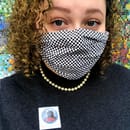Being diagnosed with anxiety is scary. There are so many ways to describe how I felt when my therapist told me I was suffering from mild to severe anxiety disorder. I immediately experienced an onset of anxiety symptoms like sweaty palms, reddened face, and a racing heart. But I also noticed a great deal of relief and clarity. Suddenly, things seemed to make sense. So many times in my life, I was told to do things because the other kids were doing them. When I couldn’t, I was made fun of, yelled at, or given up on simply because I was too afraid. Because my fears weren’t visible, they weren’t real to them. People who don’t actively experience anxiety in their day-to-day lives can have difficulty seeing things from the perspective of someone who does. Here are some pointers for understanding your own or other people’s anxiety.
Anxiety is irrational but the fear feels real.
Anxiety is the irrational fear of something that poses no immediate threat to you. Personally, I experience anxiety around insects and arachnids, in classes where I am expected to participate, and in crowded spaces. I can logically understand that an ant cannot harm me, no one will laugh at me if I get an answer wrong, and a crowd isn’t literally going to swallow me whole. However, in the moment, those fears are real to me and cause a great amount of physical distress. A good way to relieve these fears is to sit yourself down for 5-10 minutes and think about how things could go right instead of go wrong. Maybe your professor asks a question you know the answer to and you impress them with your ideas. Try to think positive through the negative (I haven’t quite figured out how to do this in the case of bugs).
Embrace Your Anxiety
This sounds scary, I know, but it’s super important. When you see, hear, smell, or feel something that makes you anxious, don’t ignore it. Instead, investigate it. If it’s a shadow in your room that your brain tells you is a monster, scope out the situation. When you stare at the shadow or run away without checking it, you are training your brain to recognize your anxiety as real fear. This is a process called “fear learning,” and it can stick with you. If you turn on the lights and figure out what caused the shadow, you instead show your brain that there was no threat. The next time you see that shadow, you will remember it’s nothing dangerous, and the “fear learning” process can be reversed. This can take time in more serious or complicated situations, but it’s extremely effective.
Everyone needs different things when they are anxious.
Like most disorders, anxiety isn’t one size fits all. Anxiety produces different reactions in different people. For instance, if I have severe anxiety, I may have an anxiety attack, specifically with shortness of breath and subsequent numbness in my face and hands. A friend in the same scenario might experience extreme nausea. It’s important to document how you feel when you’re anxious. You don’t have to keep a journal––you can even notate it one time just for reference. Write down numbers, words, draw pictures, or whatever works to rank your anxiety levels and record what you experience at those levels. I prefer to use numbers in groups, like 1-3, 4-7, and 8-10. When you have this as a reference, you can monitor your anxiety in the moment. If I’m experiencing anxiety symptoms in my 4-7 category, I find ways to lessen my fears so I don’t reach 8-10 and possibly have an anxiety attack. You can also use different anxiety management techniques for each level of anxiety. For 1-3, I like to use a stress ball or organize something that I left messy. For 4-7, I like to watch Bob Ross on YouTube or journal. Depending on where I am, my techniques vary.
Practice anxiety management techniques.
Meditation, essential oils, breathing management, progressive muscle relaxation, drawing, reading, cooking, and hundreds of other things can help you manage your anxiety. The first step is to figure out what works for you. There’s a good chance you already know, but you might have to try a few new things to find something you really like. Apps like Brightmind and Headspace provide guided meditations which can aid sleep, lessen anxiety, and calm the body and mind. Another fun app is Reflectly. This app acts as a mood tracker and journal. It sends cute motivational quotes every morning and keeps records of how you say your day went. You can even add notes about important occurrences in your day. I have found that meditation and essential oils like lavender, lemon, and ylang-ylang keep my anxiety at bay more than anything else. Experiment until you find something that works for you.
Talk to someone.
For some people, nothing helps more than talking to someone. This doesn’t have to be a therapist or counselor. Of course it can be, but it’s beneficial to find someone you’re comfortable with so you can check in from time to time. Though it has lessened recently, there is a stigma that going to therapy means you are crazy or unstable. It actually shows bravery and that you have an understanding of your mind and body. Therapy can be a form of self-care, something that college students especially can benefit from. If therapy isn’t an option for you, maybe you have a friend who also experiences anxiety. Even just comparing symptoms and discovering that you have a few in common could help you feel supported. Again, everyone experiences anxiety differently, but some symptoms are more common than others.
Just ask.
If you don’t know the answer to a question about your own anxiety, find someone who might know the answer and ask. The worst that can happen is that they don’t know. The best is that you get an answer that can help you. The same thing applies to someone who is trying to support a friend with anxiety. If you don’t know what you can do to help them, just ask. More times than not, they will be grateful to share what you can do. Once you know, you might feel more comfortable asking other people how you can help them.
Happy World Mental Health Day! Spread the word about your anxiety or try to help a friend manage theirs! Education is the first step.



